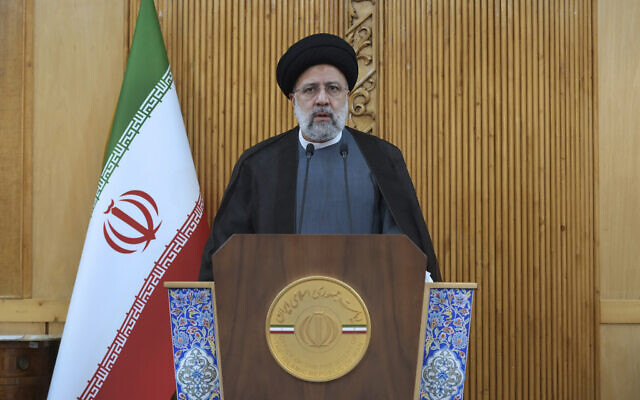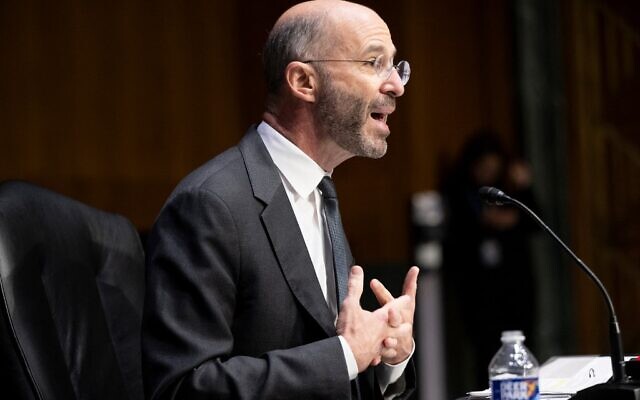Former Military Intelligence chief Tamir Hayman said Saturday he believed a return to some form of nuclear deal between Iran and world powers was preferable for Israel over no deal at all.
Speaking to Channel 12 news, Hayman said that “a framework of agreements” was the “least bad” option for Israel at the moment.”
Hayman did not elaborate what that would entail.
The retired general noted that Iran now had capabilities it didn’t previously have in the nuclear field, though it was still some distance away from obtaining a bomb.
“The facts speak for themselves,” he said of Iran’s unprecedented levels of highly enriched uranium, as well as progress in other areas of nuclear research since the 2015 accord unraveled.
“In 2015 when the deal was signed we thought it was a problematic deal, but the reality today is completely different from 2015,” he said.
Asked about the recent assassination of a senior Iranian military commander in Tehran, attributed to Israel, Hayman, now the managing director of the Institute for National Security Studies. said Iran is being sent a message that Unit 840, a shadowy division within the Islamic Revolutionary Guard Corps’ expeditionary Quds Force poses a danger for the country.
“Iran’s leader needs to understand that the [terror forces] he oversees, that endanger the security of Israelis and others all over the world, are likely to bring the conflict back home to him,” he says.

Mourners gather around the coffin of Iran’s Revolutionary Guards colonel Sayyad Khodaei during a funeral procession at Imam Hussein square in the capital Tehran, on May 24, 2022. (ATTA KENARE / AFP)
On Thursday the Walla news site reported that a senior Defense Ministry official told American officials during meetings in Washington last week that the Trump administration made a mistake by withdrawing the US from the Iran nuclear deal.
Quoting unnamed Israeli and US officials, the report said Brig. Gen. (Res.) Dror Shalom, who heads the ministry’s Political-Military Bureau, made the remarks in talks with officials at the State Department and Defense Department.
Biden officials were surprised to hear Shalom’s comments, according to sources, mainly due to the Israeli government’s ongoing objection to a return to the 2015 agreement.
The Israeli government has been pressuring the Biden administration not to return to the deal, which US former president Donald Trump withdrew from in 2018 in a move that received enthusiastic support from then-prime minister Benjamin Netanyahu.
An unnamed Israeli senior official quoted in the report said Shalom’s stance has long been known. In 2018, he reportedly voiced his objections to torpedoing the deal in a meeting with Netanyahu.
The unnamed official said that Shalom shouldn’t have expressed the sentiment to US officials, arguing they will use such remarks to boost their arguments for rejoining the nuclear deal.

Iranian President Ebrahim Raisi speaks before departing Tehran’s Mehrabad airport for a trip to Oman, May, 23, 2022. (AP Photo/Vahid Salemi)
The Defense Ministry declined to comment on the reports, according to the Axios news site. “We don’t comment on discussions in closed meetings,” a Defense Ministry spokesperson said.
According to the news site, Foreign Ministry Deputy Director-General for Strategic Affairs Joshua Zarka was in the US at the same time and delivered the opposite message, more in line with the government’s stance.
Zarka told US officials, including US Special Envoy for Iran Robert Malley, that a nuclear deal was now out of the question, as Iran had reportedly set the removal of the Islamic Revolutionary Guard Corps from the US’s foreign terrorist organizations list as a non-negotiable position.
Prime Minister Naftali Bennett revealed this week that US President Joe Biden had ruled out the removal of the group from the list.

Robert Malley, the Biden administration special envoy for Iran, testifies about the JCPOA during a hearing of the Senate Foreign Relations Committee on Capitol Hill, May 25, 2022, in Washington, DC. (Brendan Smialowski/AFP)
All but confirming Bennett’s claim, Malley told senators at a congressional hearing on Wednesday that the US would reject “demands that go beyond the scope of the JCPOA,” using the official acronym for the accord. “We are fully prepared to live with and confront that reality if that is Iran’s choice.”
Malley told the congressional panel that prospects for restoring the Iran nuclear agreement are “at best tenuous.”
